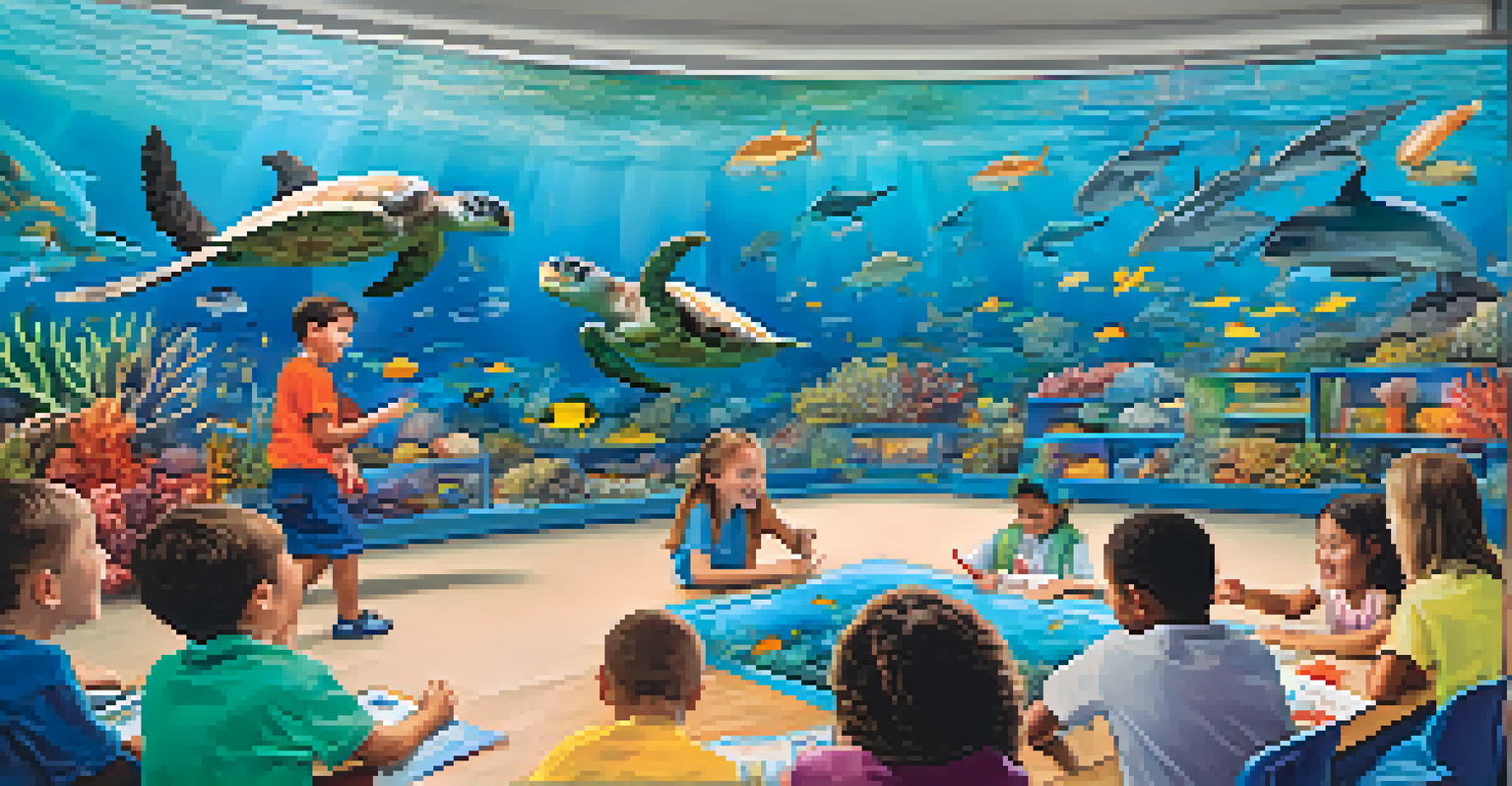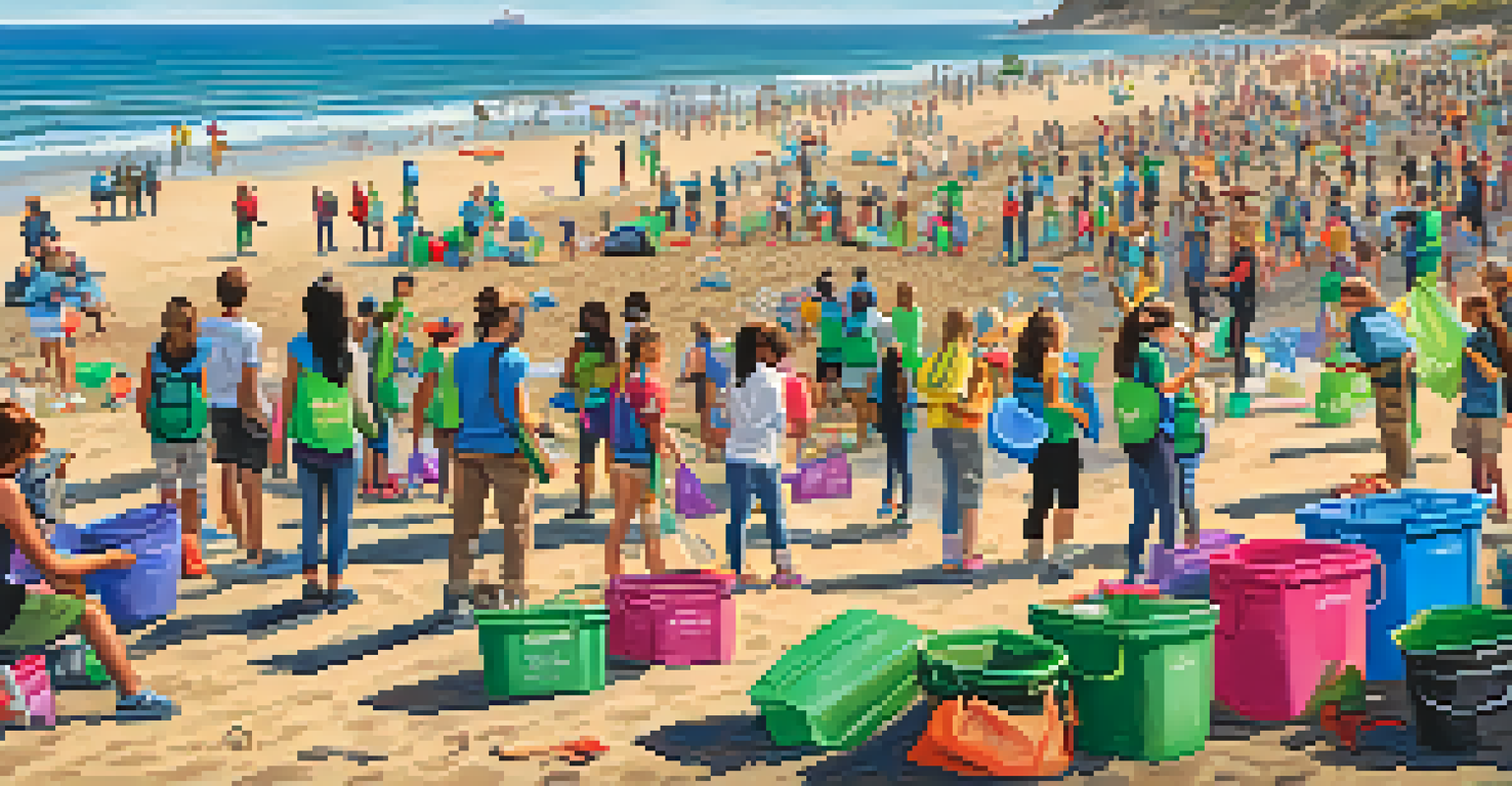Impact of Malibu's Beach Programs on Local Marine Life

Understanding Malibu's Beach Programs and Their Goals
Malibu's beach programs aim to preserve the unique marine ecosystems along its coastline. These initiatives focus on protecting local wildlife and promoting sustainable practices among beachgoers. By engaging the community, Malibu hopes to foster a deeper appreciation for marine life and the natural environment.
The greatest threat to our planet is the belief that someone else will save it.
One of the key goals of these programs is to educate the public about the importance of clean beaches and healthy oceans. This includes organizing beach clean-ups and workshops that highlight the impact of pollution on marine habitats. By raising awareness, Malibu encourages individuals to take action, ensuring the protection of its beautiful beaches.
Additionally, these programs often collaborate with local scientists and conservationists to monitor the health of marine ecosystems. This data-driven approach helps identify areas needing attention and allows for the implementation of effective conservation strategies. Ultimately, the goal is to create a sustainable relationship between the community and its marine environment.
The Role of Community Engagement in Marine Conservation
Community engagement is crucial for the success of Malibu's beach programs. By involving local residents, these initiatives foster a sense of ownership and responsibility towards the marine environment. When people feel connected to their surroundings, they're more likely to participate in conservation efforts.

Programs often include volunteer opportunities, which allow community members to get hands-on experience with marine conservation. For instance, beach clean-ups not only remove trash but also educate volunteers about the types of waste that harm marine life. This experiential learning deepens understanding and encourages long-term commitment to environmental stewardship.
Community Drives Marine Conservation
Malibu's beach programs rely on community engagement to foster responsibility and promote conservation efforts among residents.
Moreover, community events often feature guest speakers, workshops, and educational activities that highlight the significance of marine biodiversity. These events create a platform for sharing knowledge and fostering a shared vision for a healthier coastline. As a result, the community becomes a vital ally in the fight for marine conservation.
Impact of Beach Programs on Local Marine Species
Malibu's beach programs significantly impact local marine species by creating safer and cleaner habitats. Efforts such as organizing clean-up events directly reduce the amount of debris that can harm wildlife. With less litter on the beach, species like sea turtles and shorebirds have a better chance of thriving in their natural habitats.
We won't have a society if we destroy the environment.
Additionally, these programs often include initiatives to restore native vegetation along the coastline. By planting native plants, Malibu helps stabilize sand dunes and reduce erosion, which benefits marine life by maintaining healthy habitats. Healthy coastal ecosystems support increased biodiversity, providing homes for various marine organisms.
Monitoring programs also help track the health of local marine species. By assessing populations and habitats, conservationists can identify trends and implement targeted strategies to protect vulnerable species. This proactive approach ensures that Malibu's marine ecosystems remain resilient amid environmental challenges.
Educational Initiatives: Teaching About Marine Life
Education is at the heart of Malibu's beach programs. Through workshops and school programs, children and adults alike learn about the diverse marine life that inhabits their coastline. This educational focus not only informs but also empowers individuals to become advocates for marine conservation.
Programs often incorporate hands-on activities, such as tidepool exploration or marine biology classes, which make learning fun and engaging. By experiencing marine life up close, participants develop a personal connection to the ocean. This emotional bond often translates into a lifelong commitment to protecting marine environments.
Education Empowers Ocean Advocates
Through hands-on educational initiatives, Malibu inspires individuals to connect with marine life and become active advocates for its protection.
Furthermore, educational initiatives emphasize the interconnectedness of ecosystems. By understanding how human actions impact marine life, participants are more likely to adopt sustainable practices in their daily lives. This ripple effect can lead to long-lasting positive changes in the community's relationship with the ocean.
Partnerships with Environmental Organizations
Malibu's beach programs often collaborate with environmental organizations to bolster their impact. These partnerships bring together resources, expertise, and a broader network of support for marine conservation efforts. By joining forces, they can implement more comprehensive initiatives to protect local ecosystems.
For example, partnering with groups focused on marine research allows Malibu to access valuable data on species health and habitat quality. This information can guide conservation strategies and help prioritize areas needing immediate attention. The collaboration enriches the overall effectiveness of beach programs and enhances community awareness.
Moreover, these partnerships can expand educational outreach by leveraging the networks of established organizations. This means more people can participate in conservation efforts, ultimately amplifying the positive effects on local marine life. By working together, Malibu and its partners create a stronger foundation for marine conservation.
Challenges Facing Malibu's Marine Ecosystems
Despite the success of Malibu's beach programs, challenges still persist for local marine ecosystems. Climate change poses a significant threat, leading to rising ocean temperatures and altering marine habitats. These changes can affect species migration patterns and disrupt the delicate balance of the ecosystem.
Pollution remains a major concern, with runoff from urban areas contributing to water quality issues. Chemicals, plastics, and other debris can harm marine life and affect the food chain. Malibu's beach programs work tirelessly to address these issues, but community support is essential to tackle such widespread challenges.
Collaborative Efforts Enhance Impact
Partnerships with environmental organizations strengthen Malibu's beach programs by providing valuable resources and expertise for marine conservation.
Additionally, increased tourism can lead to habitat degradation if not managed properly. Overcrowding on beaches and in tidepools can stress local wildlife. Therefore, Malibu's beach programs constantly strive to balance conservation efforts with the need for public access to these beautiful natural resources.
Future Directions for Malibu's Beach Programs
Looking ahead, Malibu's beach programs aim to expand their reach and effectiveness. This includes developing new educational materials and resources to engage a wider audience. By harnessing technology, such as social media and interactive websites, they can inspire more people to get involved in marine conservation.
Additionally, there is a growing focus on enhancing collaboration with regional and national organizations. By sharing best practices and resources, Malibu can strengthen its efforts to protect marine ecosystems. This collaborative approach can lead to innovative solutions to the challenges facing local waters.

Ultimately, the future of Malibu's beach programs lies in fostering a culture of conservation. By cultivating a community that values and actively participates in marine protection, Malibu can ensure that its beautiful oceans remain vibrant for generations to come. The journey may be challenging, but the potential rewards for marine life and the community are immense.